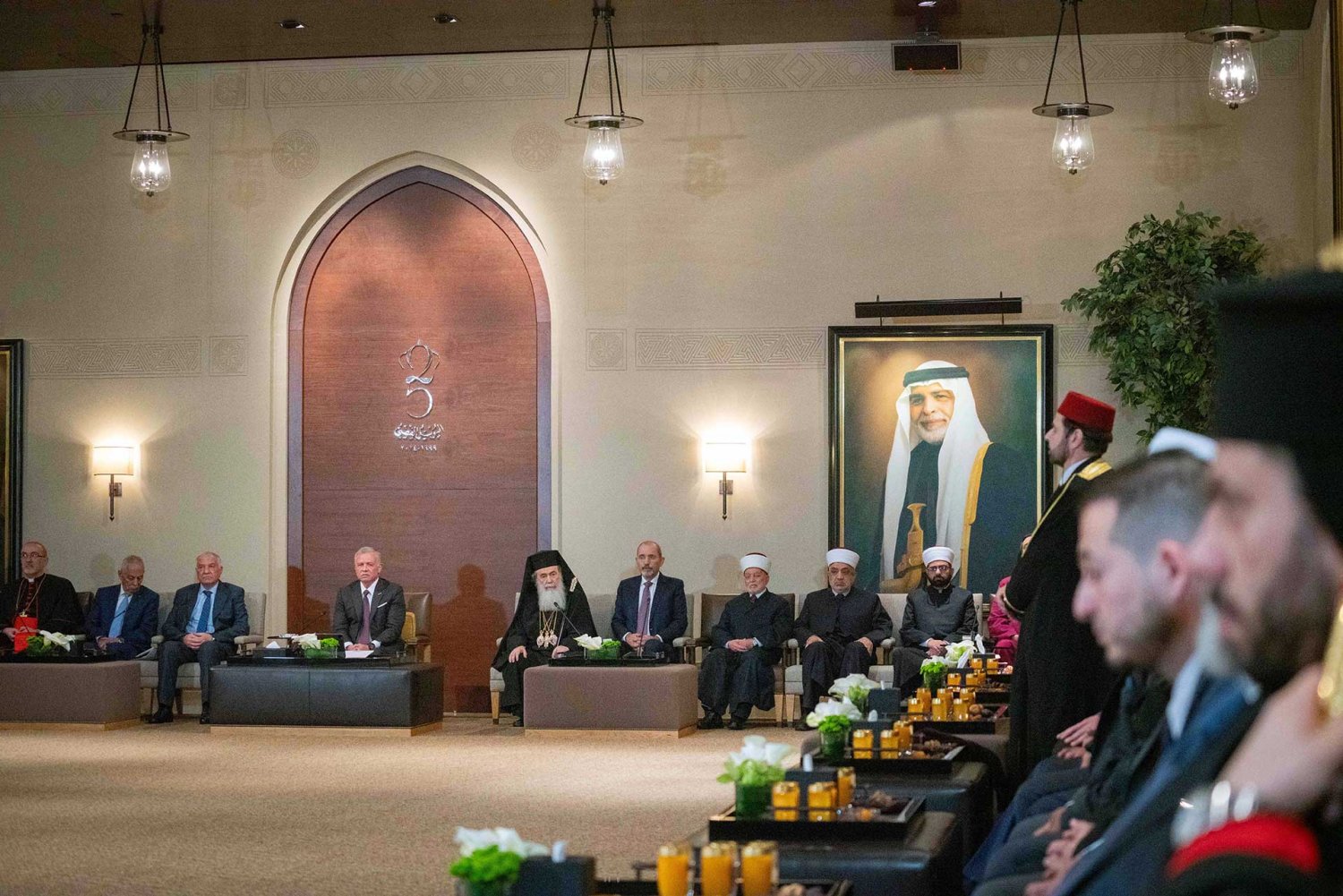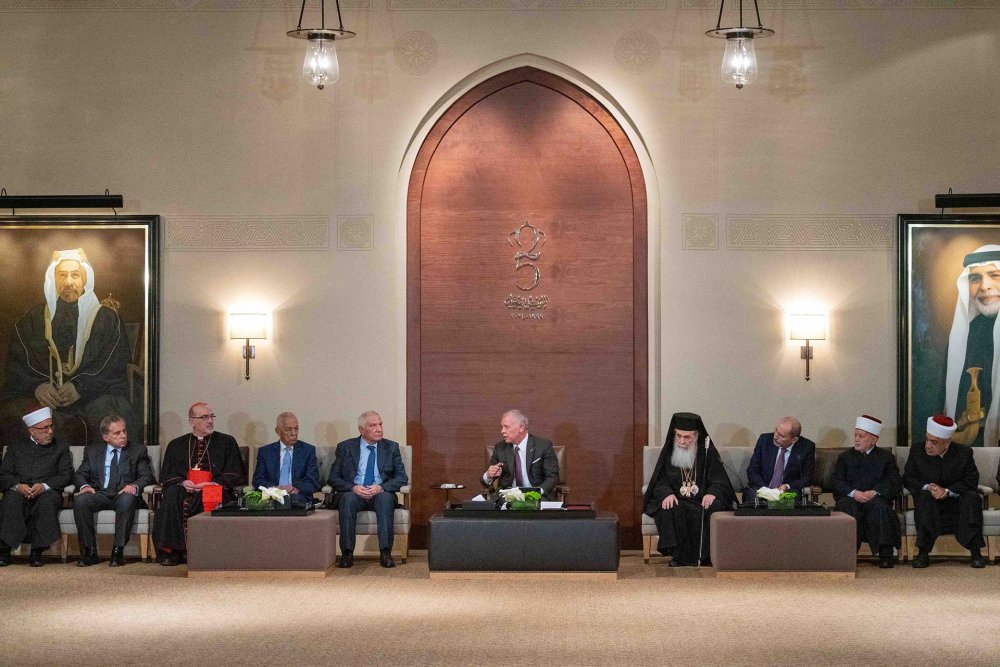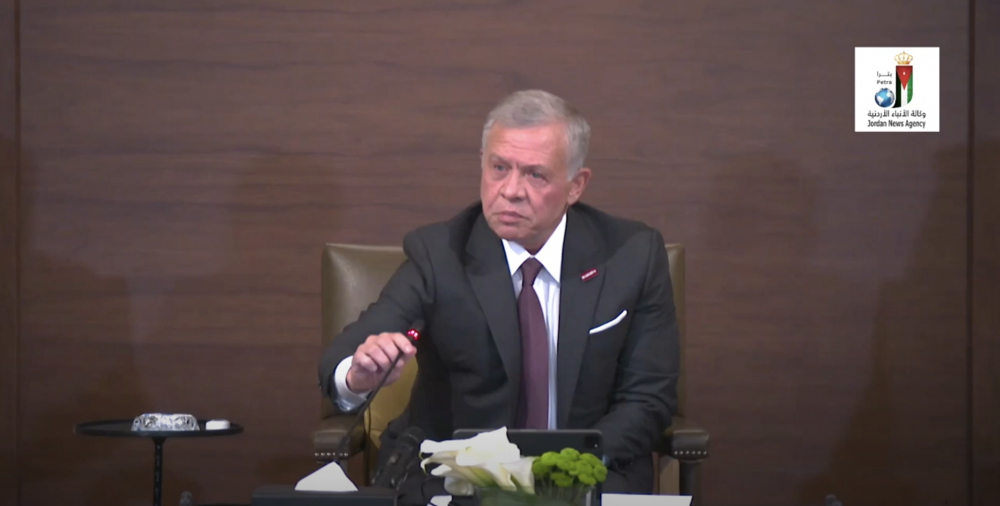Only in Amman and in the Husseiniya Palace of His Majesty King Abdullah II can Jerusalemite Muslims and Christians of all denominations come together. The traditional annual royal iftar, a well-established tradition, has become a feature of the holy month of Ramadan that Jerusalemites eagerly await every year. As soon as Ramadan starts, Jerusalemites whisper two questions to one another: Will there be an iftar this year with His Majesty the King? And . . . Who will be invited? (This author was among the invited guests this year.)

Credit:
Royal Hashemite Court RHC / Handout via Getty Images
Where Can All Jerusalemites Meet? Where but . . . Amman
There is a consensus among Palestinian Jerusalemites that, of the Arab leaders, only King Abdullah II attaches special importance to Jerusalem and its people; that he follows every issue that concerns the city, no matter how trivial; and that he raises the banner of Jerusalem and defends Christian and Islamic sanctuaries in international forums.
Indeed, at the iftar, the King reiterated his stance, saying, “I will continue to stand with full force in the face of the ongoing Israeli aggression against Jerusalem and the holy sites. The settler violence and escalation that will push the region towards the abyss must be stopped.”1
He further warned of becoming solely preoccupied by Gaza, saying:
In terms of aid, I suppose that there is no better way than through aid trucks from Jordan to the West Bank and Gaza, and we should not forget the challenges faced by our people in Jerusalem and the West Bank. I will remain in contact with all of you as we do not want to put all our focus on Gaza and then be blindsided by issues in the West Bank.2
In fact, Sheikh Azzam al-Khatib, director general of the Islamic Waqf Department, said as much in his address at the kingdom’s annual iftar on March 26, 2024: “The King has firm and consistent positions in caring for Islamic and Christian holy sites in Jerusalem, and without the Hashemite custodianship, which is a safety valve to protect the holy sites, the violations of Jewish extremists would have increased.” This sentiment was echoed in the remarks of Patriarch Theophilos III, the Orthodox Patriarch of Jerusalem, Palestine, and Jordan, who spoke about the importance of the historical role played by the King as the guardian of Christian and Islamic holy sites.
Jerusalem’s Grand Mufti Sheikh Muhammad Ahmad Hussein expressed appreciation for His Majesty’s stance in defense of al-Aqsa Mosque and his support for Jerusalemites. He warned of Israeli measures in the holy city, especially at al-Aqsa Mosque, to set up checkpoints that limit worshippers’ access.
Among the other attendees were Patriarch Pizzabella, the Latin Patriarch of Jerusalem, and Dr. Mustafa Abu Sway, a professor of Islamic studies and the first holder of the Integral Chair for the Study of al-Ghazali’s Work at al-Aqsa Mosque and Al-Quds University in Jerusalem.
In the spacious royal hall in the Raghadan Palace, one can witness a scene not found in Jerusalem. In this hall, Jerusalem’s leading Muslim and Christian figures are engaged in many side conversations ranging from public to private concerns. Everyone considers this an opportunity that will not soon be repeated, and that is why barriers evaporate between these individuals. The deep discussions among the invitees reflect the eagerness of Jerusalemites to meet one another . . . but only in Amman does that become possible.
One attendee who asked not to be named told Jerusalem Story that the Hashemite invitation is an opportunity for some Jerusalem figures to enhance their social status in Jerusalem and among their friends. The honor of being invited to listen to the speech of His Majesty the King cannot be overlooked.
The King’s speech carried messages addressed to many international parties, centered on the Hashemite concern about Gaza and the West Bank, including Jerusalem. In the presence of his Jerusalemite guests, he asserted the need to follow developments closely to prevent any Israeli surprises.
After the iftar meal, the guests dispersed and prepared to return to Jerusalem, but not before they carried with them, as is customary, a lot of m‘amul, baklava, and other pastries. Of special interest to Jerusalemites are Zalatimo sweets, the famous pastry company of Jerusalem origin. The guests focused on the sweets as if they were looking for what reminded them of the city they had left only a few hours earlier. Zalatimo, formerly Jerusalem’s oldest bakery, had to shut its doors after 150 years in Jerusalem and continues its worldwide operations outside the city in 2019.3
Notes
“The King Emphasizes Jordan’s Continued Support of Palestinian Brethren during His Meeting with Holy Figures” [in Arabic], Jordan News Agency (Petra), video, 8:28, March 26, 2024.
“Jordan’s Continued Support.”
Ronit Vered, “The Vanishing of a Legendary Palestinian Pastry,” Haaretz, July 19, 2019.


